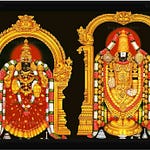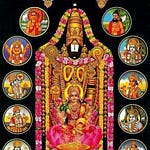After a couple of intense, complex verses, we now get a refreshing break with verse 14 this week: short, simple, and elegant.
Śrī-Svāmi-puṣkariṇikā-āplava-nirmalâṅgāḥ śreyo-arthino Hara-Viriñci-Sanandanâ-ādyāḥ | dvāre vasanti vara-vetra-hatô-uttamâṅgāḥ Śrī-Veṅkaṭâcala-pate! tava suprabhātam || (VSu 14) श्री-स्वामि-पुष्करिणिका-ऽऽप्लव-निर्मला-ऽङ्गाः श्रेयो-ऽर्थिनो हर-विरिंचि-सनन्दना-ऽऽद्याः । द्वारे वसन्ति वर-वेत्र-हतोत्तमा-ऽङ्गाः श्रीवेङ्कटाचल-पते! तव सुप्रभातम् ॥
Their limbs purified by bathing in the sacred Svāmi Puṣkariṇī tank, Śiva, Brahmā and the gods and Sanandana and the sages (all seekers of the Supreme Goal) are standing at Your gates, their heads touched by the ruling rod of Your gatekeeper: O Lord of the sacred mountain wealth-weaving, sin-cleaving Venkatam, a blessed morning unto You!
This verse beautifully depicts the gatherings of the gods and sages at the doorstep of Lord Śrīnivāsa, eager to see the Divine Couple first thing in the morning. I will emphasize just two points from this verse.
Bathing in the Divine
We are told that the gods and sages have bathed in “the Śrī Svāmi Puṣkariṇī” and have thus purified themselves. Here, we can interpret śrī-svāmi-puṣkariṇikā in two different ways:
This is the name of the sacred temple tank at Tirumala, where to this day pilgrims bathe before visiting the shrine of Lord Veṅkaṭeśvara. The gods and sages have performed their morning ablutions in the blessed Svāmi Puṣkariṇī tank, and consequently their limbs have been fully purified of all dirt, whether material or spiritual.
More poetically, we can understand the phrase śrī-svāmi-puṣkariṇikā to mean “the tank which is in fact the Husband of Śrī”. That is, the gods and sages are purified because their consciousness is fully immersed in their devotion for the Lord accompanied by Padmāvatī Tāyār. And now, they seek to see with their own eyes (pratyakṣa) their object of devotion first thing in the morning.
Such a mental bath (mānasika-snāna) is regarded as even more purifying than a physical bath.1
The ruling rod
The unusual feature of this verse is the touching of the heads of the gods and the sages by a rod. Now the basic meaning of this action should be clear: all the most exalted beings of the universe themselves gladly accept the suzerainty and sovereignty of Lord Śrīnivāsa with the Lotus-lady Padmāvatī Tāyār as the Supreme Rulers of the Cosmos.
The question that then arises is: who is exercising this rod in this fashion? There are then two possibilities.
Possibility 1: God’s gatekeepers
The word vetra applies to the protective staff that would be carried by gatekeepers (dvāra-pālas) in classical India. There are indeed multiple lists of gatekeepers for the Divine Couple—sometimes two, sometimes eight, sometimes eighteen, depending on the number of gates one needs to pass through before reaching the Lord. Of these gatekeepers, the pair Jaya and Vijaya are perhaps the most (in)famous because they were cursed—as it turns out, by the sage Sanandana and his siblings—to be reborn as mortals who would need to be punished by the Lord.
On this reading, the gods and sages first pay their respects to Lord Veṅkaṭeśvara’s gatekeepers before proceeding into the sanctum.
At a more symbolic level, the physical journey of entering a temple and passing through its multiple layers of walls and gates is meant to encode the spiritual journey of progressing through layers of our personality and our ego before we get to finally encounter the Inner Divine. The gatekeepers of the Lord represent the examinations we face at each stage in the spiritual journey, and their approving knock on our heads represents the lesson that we are supposed to learn at that particular point in our journey and carry forward as we advance on our spiritual path.
Echoes from the Tamil
This interpretation brings to mind the extremely famous sixteenth verse of the Tirup-pāvai, in which the gatekeepers to the palace-temple of Lord Kṛṣṇa’s father Nandagopa are beseeched to let Āṇḍāḷ and Her companions in:
nāyakanāy niṉḏṟa Nandagōpan-uḍaiya kōyil-kāppānē! kŏḍit tōṉḏṟum tōraṇa vāyil kāppāne! maṇik-kadavam tāḷ tiravāy (TP 16ac)
Due to the innumerable layers of meaning encoded in this verse, and the different ways in which the scholars of the Śrīvaiṣṇava tradition have construed the parts of the verse, I can only attempt to provide a very shallow, surface-level meaning in a pedestrian English translation here:
O guardian of the palace of lord Nandagopa standing so heroically! O guardian of the ornamented gateway adorned with garlands! Please open the bolt locking its bejeweled door.
Possibility 2: God’s general
The second possibility is that the vetra is being wielded by Śrī Viṣvaksena, the commander of the divine armies. One of his names is specifically Vetra-pāṇi, “the one who carried a rod in his hand”, and of course he also plays a protective role in determining who gets to enter the sanctum of the Lord.2
An analogy to a modern ritual
The gods receiving Lord Viṣvaksena’s rod on their heads is like our receiving the śathāri in Vaiṣṇava temples on our heads: These are the blessed sandals, or divya-pādukās, of the Lord that are placed on our heads, in a sign of respect and of blessing.
The connection between the two scenarios is bridged by Nammāḻvār: On the one hand, he is regarded as an avatāra of Viṣvaksena; on the other, he is also identified with the pādukās of the Lord in the Pādukā-Sahasram of Svāmī Deśikar and shares a name with them.3
|| Śrī-Padmāvatī-nāyikā-sameta-Śrī-Śrīnivāsa-parabrahmaṇe namaḥ ||
As the verse recited during the mental bath says:
apavitraḥ pavitro vā, sarvâvasthāṃ gato api vā | yaḥ smaret Puṇḍarīkâkṣaṃ, sa bāhyâ-abhyantaraḥ śuciḥ ||
Be he impure, be he pure, Whatever condition he be in— He who remembers the Lotus-eyed Lord is totally pure, both internally and externally.
As Swāmī Deśikar says in his Yatirāja-Saptati:
vande Vaikuṇṭha-senānyaṃ devaṃ Sūtravatī-sakham | yad-vetra-śikhara-spande viśvam etad vyavasthitam || (YS 3)
I salute Śrī Viṣvaksena, Commander of Heaven’s Hosts, whose spouse is the Lady Sūtravatī, upon the oscillating tip of whose ruling rod is established the whole cosmos.
For just one example, see the opening verse of the Samākhyā-paddhati, chapter 2, of the Pādukā-Sahasram:
vande Viṣṇu-padâ-āsaktaṃ tam ṛṣiṃ, tāṃ ca pādukām | yathârthā «śaṭhajit»-saṃjñā mac-citta-vijayâ-ādyayoḥ || (PāS II.1)
I salute that sage Nammāḻvār and those pādukās of the Lord: both of whom are attached to the Lord’s feet both of whom deserve the name Śaṭhâri (“conqueror of rogues”) for they have conquered my heart!









Share this post